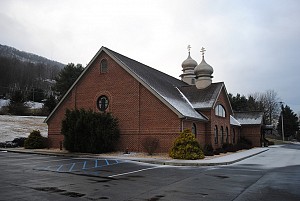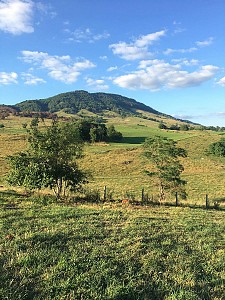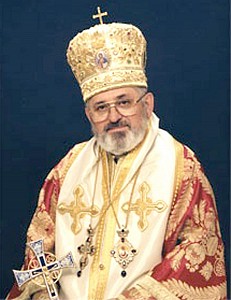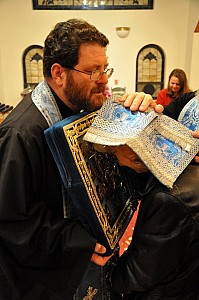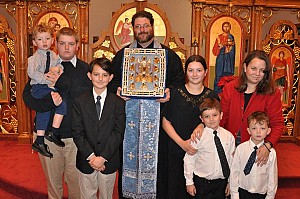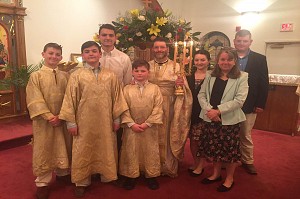Rector of Dormition of the Mother of God Church in Bluefield, WV, Priest Mark Tyson left the Patriarchate of Constantinople and joined the Eastern American Diocese of the Russian Orthodox Church Outside of Russia.
The idea of entering under the omophorion of ROCOR came to his mind at the moment when, in response to the intention to provide autocephaly to the Ukrainian Church of "Patriarch Filaret," the Synod of the Russian Orthodox Church resolved to cease commemoration of the Patriarch of Constantinople during the divine services. The priest even shared his intention with the First Hierarch of the Russian Church Abroad, Metropolitan Hilarion of Eastern America & New York.
The last straw was his encounter in church with a young man belonging to the "church of Filaret," who asked the priest for Communion – without repentance.
"At that very moment, I realized that now I would have to commune all of the schismatics and those who belong to their church, and with no repentance. And pray with them," says Fr. Mark. "I cannot stand it. It is a big deal in America, bigger than anywhere else. And I wrote to our bishop and I told him. Blood has already been shed there. Fifty parishes of Metropolitan Onufry have been stolen by these raskolniki (schismatics – ed.). What is going to happen when the state allows its full power against Kiev [Caves] Lavra or Pochaev Lavra? More blood is going to be spilled. More problems. And this is something I can’t be a part of. I do not want to be in communion with a Patriarch who will allow the blood of Orthodox Christian to be shed. This is terrible. For that reason I have left. It is unpleasant for us. But that is what it is."
He was the spiritual father of his pan-Orthodox parish, and is father of a large family. A man of sharp insight, intelligence, and a brilliant ability to grasp and foresee the situation at hand, with subtle sense of humor. A man of faith. A man of principle. A man of character.
TV: Father Mark, please tell me about your family, about your forebears. Where do they come from?
FM: I was born in June of 1966 in Williamsburg, VA, actually at a military hospital in Fort Eustace, VA, near Williamsburg. My father was a Coast Guard veteran, and I was raised as an only child with my parents. My mother was from Western Pennsylvania, Roman Catholic; my father was from Baltimore, Irish Catholic. My mother was of German background, so I have always said that I am German, English, and Irish. I was raised in Catholic schools my whole life, and I went from place to place, school to school, like many military children. I went to college in 1984 in Fredericksburg, VA, which is now called the University of Mary Washington – then it was called Mary Washington College.
I had studied the Spanish language for four years in high school and was very, very fluent, and people said, "Oh, you have a gift for languages!" Well, the hardest language the college I went to in Fredericksburg taught was Russian. It was taught by a man who was from Croatia, and Russian was maybe his fourth language, and English was maybe his fifth. I could not understand declensions. I would say, "Why is it Маркъ читаетъ по-русски, but Я дамъ подарокъ Марку? Why does Маркъ go from Маркъ to Марку? I don’t understand. Why is it Елизавета моя подруга and then it’s Я вижу Елизавету? Why does that change?” I couldn’t understand that. I had never encountered a language that had declensions! It took me a long time to figure that out.
In 1988, after about a year and a half away from school, I went to George Mason University in Fairfax, VA, and I graduated two years later with a degree in Russian and Latin American Studies.
I went to graduate school for one year in University of Illinois, I was married in June of 1991 in a Catholic church, but in between all that, I went to Moscow in 1990 as a Catholic student for the summer. While I was in Moscow, I had many wonderful experiences, but the best of all was going to Novodevichy Convent, where I was at my first Orthodox service. At the time, I had had about nine years of no churchgoing and only praying when my life was in danger. I was so moved by the service, and everybody was so good to me there, because I was a foreigner and not Orthodox. The babushki there who were selling the candles knew that it was touching me. I remember I wanted to buy a candle, and they were like, "Нет, нет, нет, нет, нет. Я тебе дам просто так – бесплатно." ("Take it for free!").
So, after my wife and I were married, we had about a year as Catholics – my wife taught in a Catholic school and I went to a graduate school – and I became very interested in the Faith. So, I decided to leave graduate school and go to seminary after becoming Orthodox.
I was received into the Greek Orthodox Church (Œcumenical Patriarchate), on Pentecost Sunday, 1992. We immediately went to Johnstown, like typical converts: "Now I amm Orthodox and I amm going to be a priest!". I mean, ridiculous. I wish I could have lived five, six, seven years as a simple layman. So, we went to Johnstown. I had met some people from our seminary and diocese before that, and we were received into the Carpatho-Russian Diocese under the Œcumenical Patriarchate. In December of 1993, I was ordained a deacon; in September of 1995, I was ordained a priest, and I was sent a month later to Chicago, to the area where we worked with the parish there to build a church. The church, thank God, was built, but after five years there, the bishop moved us to Connecticut, to a very large historic parish in Bridgeport, CT, where we stayed for only nine months. It was a very bad neighborhood – a ghetto – a lot of gunshots, hypodermic needles on the church steps, empty bottles of liquor, so I begged the bishop to let me go to Bluefield, WV.
TV: A Carpatho-Russian bishop?
FM: Yes, Metropolitan Nicholas (Smisko). What a beautiful man! He died almost eight years ago. He was my Father-in-Christ. We were very close. He was the one who gave me everything I have. From the Carpatho-Russian folk songs that I know, like, "Daj že Bože dobryj čas" or "Dva Holubki" or my favorite, "Cervenna Ruza." And, of course, the chant. I can play all these on the guitar and sing them. And we used to sing together! I rode many, many thousands of miles with the Metropolitan in his car, driving him as a deacon and singing with him.
When our protodeacon, Fr. John Youhas, got sick, he said, "Marko, you be my deacon for a while."
TV: He called you Marko, the way Serbians and Carpatho-Russians usually do?
FM: Yes, Marko. I will never forget the day that he ordained me to the priesthood. He always got up so early, and was always the first everywhere. When we had liturgies at 7:30 in his chapel, and we would go there to sing, I would walk in the door at 7 AM; he was already censing the iconostas. So, I run to get the hot water, open up the book, get the read of the prokimenon, because he was ready to start.
I got to the cathedral very early on September 10, 1995, the Eve of the Beheading of St. John the Baptist, and I was ordained on that Sunday. Vladyka was the only one in church. I venerated the altar, he blessed me, and said, "Son, are you ready for this great day?" He was a pious man. He knew everything about our people, our diocese, our chant.
The phone would ring at my place at about 4:30, I would pick it up and he would say, "Marko, what are you eating tonight?" And I would say, "Vladyka, I haven’t cooked dinner yet," because Lisa was working as a Montessori teacher at the time. And I said, "I don’t have anything." And he said, "You wait right there, you’ll hear my horn." We lived on this very narrow street in this little old town in Pennsylvania, and he would drive up – honk honk! And I would walk out, and he would have a big pot of goulash or chicken or whatever. He was a great cook. And I would take out the pot, and he would say, "You better return that pot to me clean. I want it clean. Don’t make me wash this pot!"
So many times, he would invite us to his house, and he would cook for us, and then we had to do the dishes. We would clean, he would cook.
When he came to my parish in Chicago, he would wake up at like 4 in the morning, and I would think I was getting up early at, say, 6, and already when I woke up, I could smell breakfast. Vladyka was cooking breakfast downstairs. He was so delightful, and so funny. His name was very good, his familija [surname] – Smisko like, смѣшной человѣкъ. And he was exactly like that. He was delightful, and he treated us so well, always generous and kind. When my son was born, Nicholas, I named him after Vladyka. Not to be a suck-up, that was real love. And, you know, when my son Nicholas was born on March 15, 1995 – he baptized him on Pascha! I asked the Metropolitan, not knowing at the time how exhausted bishops and priests are on Pascha, and how they just want to lie down. I said, "Vladyka, would you baptize Nicholas on Pascha?" I remember, he said, "Yes!"
So, I was assigned in Chicago for five years, like I said, then nine months at Bridgeport, then 19 years in Bluefield. A beautiful parish, newly built in the year 2000. We went there in November of 2001, and three of my six children were born there, and 17 years of work – I hope, solid pastoral work.
TV: When did you decide to leave the parish and the Carpatho-Russian Church? What was your reason exactly?
FM: I heard from friends of mine who were priests, some were Carpatho-Russian, some were ROCOR, that this could be a very, very big issue and a big problem. That is could possibly resonate like the Schism of 1054 between the Roman Catholic Church and the Orthodox Church. I was involved in my parish, I was involved in my farm, I was involved in local things, and I began to read more and more, and it became very clear to me who Filaret Denysenko is, and who Makary Maletych is, and these priests of theirs who are either rabid nationalists or were defrocked for other crimes that we don’t know about, but now are all canonical priests. I was worried about this from the get-go. I tried to do some research to take the parish with me, to present the situation to them and to have them vote, but when I learned that we would lose everything, I said no. So, the decision to leave the Œcumenical Patriarchate was predicated on whether communion would be broken between Moscow, Metropolitan Onufry, and the Ukrainian Church and the Œcumenical Patriarchate. When that communion was broken, having realized that the parish would not be able to go, I left personally.
I sent a letter of resignation to my bishop, Gregory [of Nyssa], in Johnstown on October 15th at about 8 PM that I had been received just a few hours before that by Metropolitan Hilarion. The next day, Bishop Gregory called me, and we spoke for two solid hours. He offered me various solutions to the problem, none of which were satisfactory to me.
TV: Did you get a canonical release?
FM: Not from him, no. But I have my canonical acceptance from Metropolitan Hilarion.
TV: Do you have to get a release?
FM: At this time, because communion is broken, no.
TV: When did Metropolitan Hilarion accept you?
FM: October 15th. The same day that communion was broken. I had written to him in early September asking him, if this tragedy were to occur, would he accept me? because we knew each other a little. I have served with him in St. Tikhon’s Church in Bristol, VA, and in the Monastery of the Holy Cross in Wayne, WV. He was kind enough to offer that acceptance, if communion were to be broken, without any kind of canonical release.
TV: What about your parish? Do they support you?
FM: They are shocked, heartbroken, some people are angry at me.
TV: How many people are there in your parish? And what are their nationalities?
FM: Fewer than 50, and it is a pan-Orthodox parish. There are Romanians, Greeks, Lebanese, Carpatho-Russian, and converts. Oh, and two Ukrainian nationalists who love Filaret.
About six years ago, it was Pascha, Velikdeň – the Great Day, as our people would call it, and I amm giving the cross to people at the end of Liturgy, and this one woman comes up and I say, "Christos voskres!" She said, "Як наш патриарх Филарет сказал – Украина воскреснет як Христос воскресл." I had no answer. I just looked at her and she walked out. After Maidan in 2014, I had some Russian parishioners, and these very aggressive people pushed them out of the parish. "Или вы с нами или вы – против нас [Either you’re with us or you’re against us]."
TV: You have been a priest 23 years. How do you support your family?
FM: For the last eight years or so that I was there, I received in salary $4,000 a month. And that was from the parish – about $48,000 a year. I never had an outside job.
TV: And what about now?
FM: I have nothing. I have been attached to St. Tikhon’s parish in Bristol.
TV: Will you move your family? How will you support them?
FM: We have a farm – 12 acres, in Tazewell County, VA. It is about 35 minutes from my old parish and about an hour and a half from the church in Bristol. I have a mortgage to pay on the farm, I have now to pay all my health insurance; my wife has health insurance with her job; she is a librarian.
TV: What about the children?
FM: I have a son in high school, John. And Ambrose and Nathaniel, I was teaching them at home. So, I do not know whether we will have to put them in school or…
I know it sounds foolish of me to make a rash decision from a material point of view, but you know, it was a foolish decision for me to become Orthodox according to my family. They were all Catholic and they said, "What are you doing? This is crazy." And then it was a foolish decision, my friends thought, to go to seminary, because they said, "You could do a lot of other things. You don’t need to be a priest. You don’t have that temperament." Then it was a foolish thing for me to be obedient to Vladyka Nicholas and go to Chicago, because the older people there were very brutal. Very tough people. They were very abusive to the clergy.
TV: The immigrants?
FM: No, Americans. The immigrants usually have respect for the priesthood that the first-generation Americans do not have.
That was the situation there. I was blessed to go to Russia five times. I have been there in 1990, 1997, and 1998 as a priest, and 2017 with my son Nicholas for three weeks, and 2018 with my daughter Catherine for two weeks. She is a Chemistry and Russian major at William & Mary in Virginia, and she is going actually to live and study in Russia the coming semester – the spring semester of 2019.
As much as I love the Russian language, Russian people, Russian culture, Russian food, Russian religion, the move that I have recently made – it is not because of Russia. Many people were saying that, and I am hearing through gossip, that "Oh, Fr. Mark was always a lover of Russia." It is not about Russia. It is about the Church. What Patriarch Bartholomew did is very wrong on so many levels, and I did not want to be in communion with people who were criminals and showed no repentance. So, thank God, I have the opportunity to come to the safe Church haven as Metropolitan Hilarion calls it, and I came to the Zarubezhnaya Tserkov. So, that is the situation there. After 17 years, we had to walk away from everything and our parish. We had to leave, my family and I – the three children who are still home. And we could not take our parish with us, because we knew a court case would ensue and we would lose the church and our people would become embittered, and they would lose focus on the Faith and on the Lord. So, I have had to leave my parish and my income.
TV: Does your Matushka support your decision?
FM: Yes, glory to God, she does. We became Orthodox together, we entered the American Carpatho-Russian Diocese together, we went from parish to parish together.
That is very painful for me. I am not an attention-seeking person, I am not trying to be some star here. I just had to leave the Patriarchate, because of what he did in Ukraine.
I love the Russian Church: this year, I celebrated Nativity in Pechory near Pskov, I was in the altar serving.
TV: This past Nativity?
FM: Yes, this January I was able to do that. It was wonderful. I was very, very, very happy to be in Pechory.
TV: It seems that the Russian Church is very familiar to you. Do you feel at home in here?
FM: I do. I felt very blessed to serve [under ROCOR] Vigil on the eve of the Feast of the Optina Elders, October 23, and I brought with me a tiny prayer rope from Optina, and the cassock and the ryassa that I was wearing were made in Optina in 2017. And while I was at Optina, I had a chance to serve Liturgy in the skete, and I met many wonderful men. My son Nicholas and I worked in the prosphornaya [bakery – ed.] at Optina for a week. I met Fr. Benedict the abbot, who is now reposed. We just had a wonderful time, and I feel very close to Optina, very close to the people there: Fr. Zenon, Fr. Valery, Fr. Ephemy, Fr. Seraphim. I feel very blessed to have these ties. And Fr. Joasaph from Pechory! He is one of the main characters in the book Everyday Saints, and I met him with Nicholas in the square before the Dormition Church. He opened up the lower caves, we went through the whole caves, we venerated, we went to his house and had tea with him, and then I felt so close to him that, last October, I called him and asked, "Can my daughter Catherine and I spend Christmas with you?" "Absolutely, Father! Come!" So, we had Christmas there. And during the All-Night Vigil for Nativity, they gave me the oil, and I started to anoint the people. The church was packed, you couldn’t move…
"S prazdnikom! S prazdnikom! S prazdnikom!" And the people were reacting to that joy – my joy and their joy, we came together. And this one little old lady came up to me, and I anointed her: "S prazdnikom!" and she says, "Вы из Сербии? [Are you from Serbia?]" I said, "Нет, американец [No, I am an American]." She stood there while "S prazdnikom! S prazdnikom!" and then she said to me in English (heavily accented) "Merry Christmas!" Oh, what a joy!
Then, later on, I went up to the choir – they have three choirs – and I anointed all of the singers.
The next day I served with the abbot, who was also Fr. Tikhon. He died recently – I have been praying for him.
There were many children there, and I got to commune these beautiful Russian children with names like Apollinaria, Tikhon, Pavel, and everyone was so serious at the chalice, and I was just in heaven. I loved every minute of it. So, thank God, I had many good experiences there.
TV: Nice to hear that! And what are your plans for the parish that you may be assigned to, as a rector?
FM: Right now, I am helping Fr. Matthew Williams at St. Tikhon’s. As for the future, I just don’t know. I am hoping that I can maybe do some telecommuting, maybe some editing for some Russian publications that might need some help with their English Department.
TV: The Lord knows how to help.
FM: He does. You do not know what will be the future. So, what will be – will be. I do not know just yet, but I feel like something will happen that is good.
* * *
According to Fr. Mark, this transfer to ROCOR is his personal choice, and he is not intent on discontinuing his communication with his friends – both clergy and laity – from the Churches under Constantinople.
"Four of my six children have Greek godparents. It is sad that now I cannot commemorate those close to me during the Eucharist. But I will always remember them in my private prayers."
Interviewed by Tatiana Veselkina

